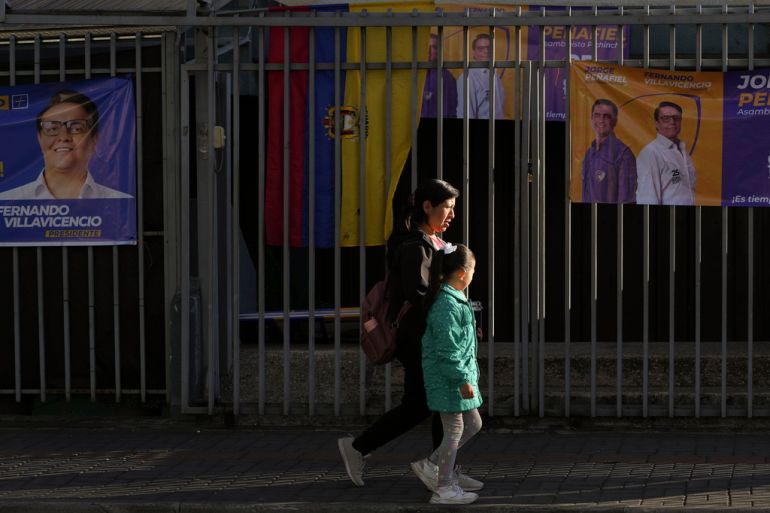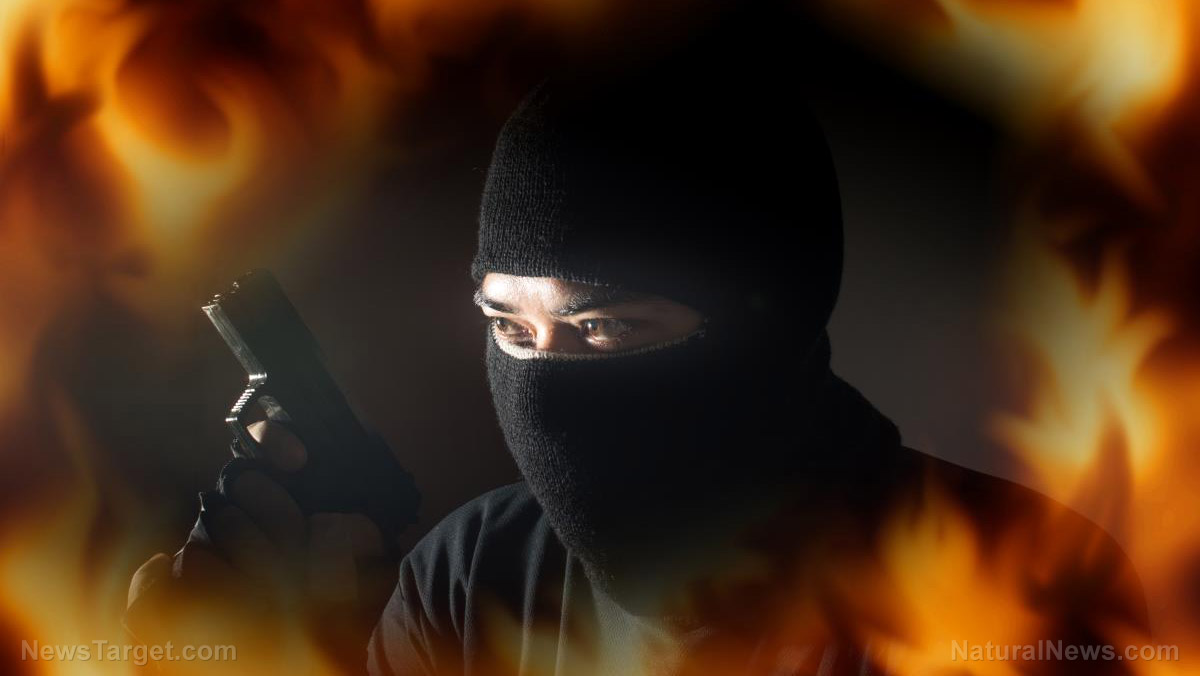Murdered By Drug Cartel: Ecuador’s Presidential Candidate
What does the assassination of a presidential candidate mean for Ecuador?
The slaying of anti-corruption advocate Fernando Villavicencio has underscored the threat of rising crime in Ecuador.

As Ecuador reels from the assassination of a high-profile presidential candidate, experts say the event underscores growing violence driven by powerful criminal groups in the South American nation.
Fernando Villavicencio was killed at a political rally in the capital of Quito on Wednesday, sending shockwaves through Ecuador, which is set to hold a presidential election on August 20.
KEEP READING
list of 3 items
Ecuador’s embattled President Lasso will not seek re-election
Ecuador announces state of emergency after mayor shot to death
Ecuador beset by crime, economic woes ahead of presidential vote
end of list
The candidate was as an outspoken critic of corruption and the drug-trafficking groups that have expanded their influence in Ecuador in recent years.
While details of the crime remain murky, Ecuador’s police have arrested six suspects, all of whom are Colombian, according to officials. A seventh suspect was killed in Wednesday’s gunfire.
In the hours following the shooting, President Guillermo Lasso blamed criminal networks for the violence.
“Organised crime has come a long way, but the full weight of the law is going to fall on them,” Lasso wrote on social media.
He declared a three-day state of emergency and appealed to the Federal Bureau of Investigation (FBI) in the United States for assistance in his government’s investigation.
Crime rates, unemployment on the rise
Ecuador was once regarded as a source of relative calm in a region with a long history of violence and civil conflict. But over the last several years, the country has seen a surge in crime, with 2022 tallying record levels of homicides and drug seizures.
Given Ecuador’s location on the coast between cocaine-producing regions in Peru and Colombia, the country has become much sought-after territory for the drug trade. Ecuador’s gangs have increasingly joined forces with international drug-trafficking organisations, helping to drive the spike in violence.
The COVID-19 pandemic also had a devastating impact, particularly in poorer communities, with morgues overflowing in cities such as Guayaquil. The virus contributed to a severe economic downturn that Ecuador is still recovering from, and experts say a lack of employment opportunities has created a growing pool of potential recruits for criminal groups.
Government statistics indicate that less than four out of 10 Ecuadorians participating in the workforce were adequately employed, with the majority making less than the minimum wage of $450 a month. Since the beginning of the year, more than 822,000 people between the ages of 18 and 45 have left the country seeking opportunities elsewhere.
Juanita Goebertus, director of the Americas division for Human Rights Watch, tied Wednesday’s assassination to the ongoing instability in the country.
“This is a tragedy that was probably something people could expect, given the very serious deterioration of the security situation in Ecuador,” she told Al Jazeera. “If you compare the homicide rate between 2021 and 2022, there’s an increase of over 80 percent.”
Villavicencio’s death, for instance, comes just over two weeks after another high-profile assassination: that of Agustin Intriago, mayor of Manta, on July 23.
The increase in violence can be seen in other domains as well. Goebertus said the national police recorded 5,000 cases of extortion in 2022, a figure that is on track to double by the end of 2023.
Prisons, where gangs exercise substantial control, have been sites of especially grim violence. More than 30 people were killed in riots last month at a Guayaquil prison, leading the Lasso government to deploy armed forces to take back control of the facility.
Human Rights Watch said in a press release on Thursday that more than 600 people have been killed in prison massacres over the last several years. Poor conditions like overcrowding contributed to the violence, the nonprofit explained.
Calls for a ‘hard hand’
While the killing of Villavicencio has been met with condemnation across the political spectrum, it has already started to map onto familiar political divides.
“Within Ecuador, you’re seeing everyone condemn the assassination,” said Will Freeman, a fellow of Latin America studies at the Council on Foreign Relations, a US-based think tank. “Unfortunately, you’re also seeing people jumping to conclusions and to some extent trying to squeeze some political benefit out of this killing.”
Freeman said that critics have highlighted Villavicencio’s history of corruption allegations against former President Rafael Correa, seeming to imply — without evidence — that the assassination was a form of political payback.
Correa’s supporters have likewise accused President Lasso of mafia-like corruption in the wake of the shooting. Freeman said he expects Correa’s allies to leverage the killing to advance their own priorities as well.

The proliferation of rumours underscores the necessity for a “rapid, transparent investigation” to provide the public with reliable information, Human Rights Watch’s Goebertus said.
Some figures have also used Villavincencio’s killing to bolster calls for a more heavy-handed response to crime in Ecuador.
Shortly after the shooting, for instance, presidential candidate Jan Topic posted a video on social media reiterating his call for a “mano dura” or “hard hand” against criminal groups.
He has previously expressed support for Ecuador to implement a “state of exception” similar to El Salvador’s, where certain civil liberties have been suspended in order to sweep tens of thousands of alleged gang members into prison.
Goebertus said that doing this would be a mistake. Her organisation has been outspoken against El Salvador’s gang crackdown, which has been tied to false arrests and torture.
No amount of force, Goebertus emphasised, can fill the void created by a state that lacks the capacity to function effectively and protect its people. She called instead for a more targeted approach.
“You need a security policy that can strategically persecute leaders of gangs, severing their links to access finance and corruption networks,” she said. “And that requires serious investigative and judicial capacity, as opposed to resorting to states of emergency or militarisation that have not proven effective.”

Outgoing Ecuadorian President Guillermo Lasso has declared a state of emergency and arrested at least six individuals due to the assassination of presidential candidate Fernando Villavicencio.
Villavicencio, 59, was a conservative and former member of Ecuador’s National Assembly. During his tenure, he was a vocal critic of corruption and organized crime. He was assassinated on Wednesday, Aug. 9, while walking to his car from a campaign rally in the capital of Quito.
Nine other people were injured during the assassination, including three police officers and a candidate for the National Assembly. A suspected gunman also died of wounds sustained during a brief exchange of gunfire with the Ecuadorian police.
During his tenure as a legislator and when he was a journalist, Villavicencio had railed relentlessly against graft and corruption. He also pledged to take the fight directly to Ecuador’s drug gangs if elected president.
In response to the assassination, Lasso declared a 60-day nationwide state of emergency to bring down the levels of drug-fueled violence in the country. The declaration curtails certain civil liberties such as freedom of movement and assembly.
“The armed forces as of this moment are mobilized throughout the national territory to guarantee the security of citizens, the tranquility of the country and the free and democratic elections of Aug. 20,” said Lasso.
Villavicencio’s rivals for the presidential election have all suspended their campaigns following the assassination. Lasso, who described the assassination as a “political crime,” also declared three days of national mourning and said the Aug. 20 election will proceed as planned.
“We aren’t going to hand over power and the democratic institutions to organized crime,” said Lasso. “The elections aren’t going to be suspended.”
The presidential candidates are set to resume campaigning sometime after the national period of mourning.
Suspects are Colombians part of drug trafficking crime gang
Authorities claim that the six suspects arrested right after the assassination are Colombians who are part of a drug trafficking criminal organization. A high-ranking police official noted that some of the Colombian suspects already had criminal records in Ecuador and had also committed crimes in Colombia, where the trade in cocaine continues to flourish. (Related: Cocaine-producing giant Colombia seeks to DECRIMINALIZE the drug.)
“They are part of organized crime,” said the official. “They are connected to drug trafficking and other crimes.”
Ecuadorian authorities are currently pursuing the “intellectual authors” of the assassination.
The involvement of Colombian nationals has drawn comparisons to the 2021 assassination of Haitian President Jovenel Moise, whose home was invaded by a group including at least 26 Colombians and two Haitian-Americans, killing him and injuring his wife.
Villavicencio’s death has also drawn comparisons to the 1989 assassination of Colombian presidential candidate Luis Carlos Galan, who had drawn the ire of notorious drug kingpin Pablo Escobar after he campaigned on pledges to extradite drug traffickers to the United States. Escobar’s henchmen, in cooperation with corrupt security officials, later assassinated Galan.
Days before his assassination, Villavicencio made multiple references to a criminal organization known as Los Choneros, a drug trafficking organization with origins dating back to the late 1990s in the coastal city of Manta. Los Choneros is regarded as one of the most powerful criminal organizations in Ecuador and is known to work with the extremely powerful Mexican Sinaloa Cartel to traffic cocaine to the United States.
It is still unclear whether Los Choneros was responsible for the assassination. At least one other group known as Los Lobos (The Wolves) has posted a video on Twitter with masked members claiming responsibility for the killing. Another video posted by unmasked Los Lobos members refuted this first statement and claimed that the gang was not involved.
In one of his last interviews, he accused authorities of not doing enough to deal with the recent crime wave gripping Ecuador. Villavicencio even spoke of threats made against him personally by a criminal nicknamed Fito. The man reportedly sent intimidating messages to him.
“If I continue mentioning Fito and Los Choneros, they will break me,” he said. But Villavicencio refused to be blackmailed. “Here I am, I am showing my face, I am not afraid of them.”
In his last speech, mere minutes before his assassination, Antonio Lopez, Villavicencio’s campaign director, recalled the candidate telling his supporters that he was proud to be hated by criminals. Villavicencio then reiterated his promise to go after criminals and said that if elected he would give gangs 90 days to hand over all of their weapons before he goes after them.
“Democracy has been gunned down and the fight against corruption has been mutilated,” said Lopez. “His biggest fight was to combat the narcopolitics.”
Watch this short clip featuring the moment when Ecuadorian presidential candidate Fernando Villavicencio was assassinated.
This video is from the Cynthia’s Pursuit of Truth channel on Brighteon.com.
More related stories:
Radical LEFT-WING CULT plots in a private online chatroom to MURDER COPS.
UN report: Cocaine smuggling and production increase amid growing demand for illicit substances.
Sources include:













